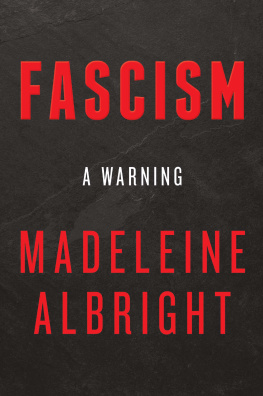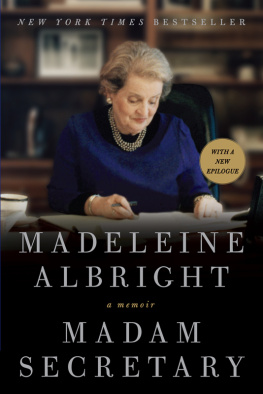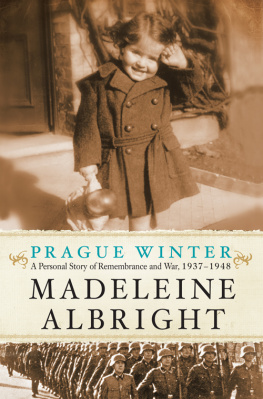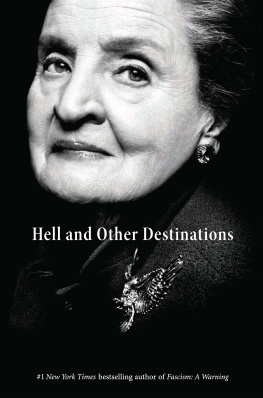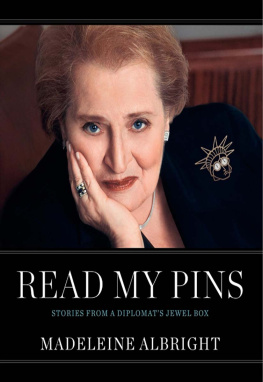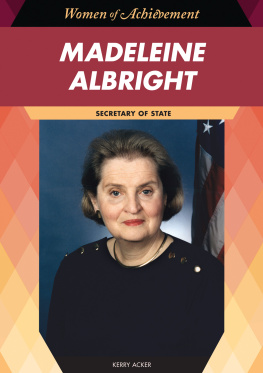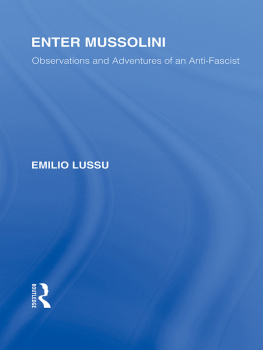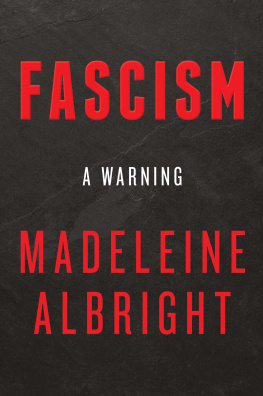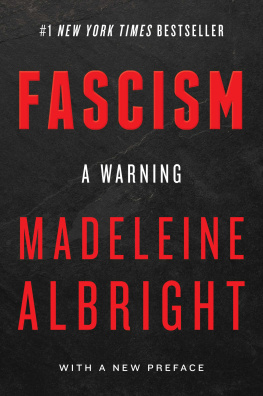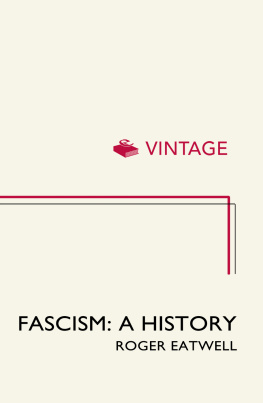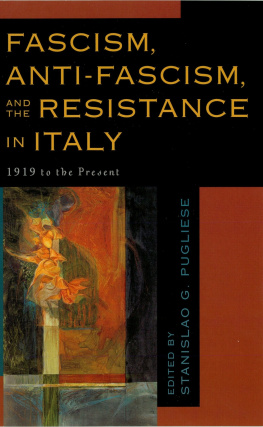Every age has its own Fascism.
O N THE DAY FASCISTS FIRST ALTERED THE DIRECTION OF my life, I had barely mastered the art of walking. The date was March 15, 1939. Battalions of German storm troopers invaded my native Czechoslovakia, escorted Adolf Hitler to Prague Castle, and pushed Europe to the threshold of a second world war. After ten days in hiding, my parents and I escaped to London. There we joined exiles from all across Europe in aiding the Allied war effort while waiting anxiously for the ordeal to end.
When, after six grueling years, the Nazis surrendered, we returned home with high hopes, eager to build a new life in a free land. My father continued his career in the Czechoslovak Foreign Service and, for a brief time, all was well. Then, in 1948, our country fell under the control of Communists. Democracy was shut down and once more my family was driven into exile. That Armistice Day, we arrived in the United States, where, under the watchful eyes of the Statue of Liberty, we were welcomed as refugees. To protect us, and to make my life and those of my sister, Kathy, and brother, John, seem as normal as possible, my parents did not tell us what we would learn only decades later: that three of our grandparents and numerous aunts, uncles, and cousins were among the millions of Jews who had died in the ultimate act of Fascismthe Holocaust.
I was eleven when I came to the United States with no goal more ambitious than to become a typical American teenager. I ditched my European accent, read stacks of comic books, glued my ear to a transistor radio, and became stuck on bubble gum. I did everything I could to fit in, but I could not escape knowing that, in our times, even decisions made far away could spell the difference between death and life. On entering high school, I started an international affairs club, named myself president, and provoked discussions about everything from Titoism to Gandhis concept of satyagraha (The Force which is born of Truth and Love).
My parents cherished the freedoms we found in our adopted country. My father, who quickly established himself as a professor at the University of Denver, wrote books about the perils of tyranny and worried that Americans were so accustomed to libertyso very, very free, he wrotethat they might take democracy for granted. After I began a family of my own, my mother called each Fourth of July to confirm that her grandchildren were singing patriotic songs and had been to the parade.
There is a tendency among many in the United States to romanticize the years just after World War IIto imagine a time of sky-blue innocence when everyone agreed that America was great and each family had a reliable breadwinner, the latest appliances, children who were above average, and a rosy outlook on life. In fact, the Cold War was a period of unceasing anxiety in which the lingering shadow of Fascism was darkened by another kind of cloud. In my teenage years, due to atomic tests, the radioactive element strontium 90 was found in babies teeth at fifty times the natural level. Virtually every town had a civil defense warden urging the construction of backyard fallout shelters stocked with canned vegetables, Monopoly boards, and cigarettes. Children in big cities were issued metal tags, embossed with their names, for identification should the worst happen.
Growing older, I followed in my fathers footsteps and became a professor. Among my specialties was Eastern Europe, where countries were dismissed as satellites orbiting a totalitarian sun, and where it was widely thought that nothing interesting ever happened and nothing of importance would ever change. Marxs dream of a workers paradise had degenerated into an Orwellian nightmare; conformity was the highest good, informants kept watch on every block, whole countries lived behind barbed wire, and governments insisted that down was up and black was white.
Then, when change did come, it was with a velocity that amazed. In June 1989, the decade-old demands of dockworkers and the inspiration of a pope born in Wadowice brought democratic governance to Poland. That October, Hungary became a democratic republic, and in early November the Berlin Wall was breached. In those miraculous days, our televisions brought news each morning of what had long seemed impossible. I can still picture the decisive moments of my native Czechoslovakias Velvet Revolution, so called because it was secured without the widespread cracking of heads or gunfire. The time was a frosty afternoon in late November. In Pragues historic Wenceslas Square, a crowd of 300,000 joyously rattled keys to emulate bells tolling the end of Communist rule. On a balcony overlooking the throng stood Vclav Havel, the valiant playwright who six months earlier had been a prisoner of conscience and five weeks later would be sworn in as president of a free Czechoslovakia.
In that instant, I was among the many who felt that democracy had aced its severest test. The once mighty USSR, made fragile by economic weakness and ideological weariness, shattered like a dropped vase on a stone floor, liberating Ukraine, the Caucasus, the Baltics, and Central Asia. The nuclear arms race subsided without blowing any of us to bits. In the East, South Korea, the Philippines, and Indonesia cast off longtime dictators. In the West, Latin Americas military rulers made way for elected presidents. In Africa, the freeing of Nelson Mandelaanother prisoner who became presidentengendered hopes of a regional renaissance. Around the globe, countries meriting the label democracy expanded from thirty-five to more than one hundred.
In January 1991, George H. W. Bush told Congress that the end of the Cold War has been a victory for all humanity... and Americas leadership was instrumental in making it possible. Across the Atlantic, Havel added, Europe is attempting to create a historically new kind of order through the process of unification... a Europe in which no one more powerful will be able to suppress anyone less powerful, in which it will no longer be possible to settle disputes with force.
Today, more than a quarter century later, we must ask what has happened to that uplifting vision; why does it seem to be fading instead of becoming more clear? Why, per Freedom House, is democracy now under assault and in retreat? Why are many people in positions of power seeking to undermine public confidence in elections, the courts, the media, andon the fundamental question of earths futurescience? Why have such dangerous splits been allowed to develop between rich and poor, urban and rural, those with a higher education and those without? Why has the United Statesat least temporarilyabdicated its leadership in world affairs? And why, this far into the twenty-first century, are we once again talking about Fascism?
ONE REASON, FRANKLY, IS DONALD TRUMP. IF WE THINK OF FASCISM as a wound from the past that had almost healed, putting Trump in the White House was like ripping off the bandage and picking at the scab.
To the political class of Washington, D.C.Republican, Democrat, and independent alikethe election of Trump was so startling it would have caused an old-time silent film comedian to clench his hat with both hands, yank it over his ears, leap in the air, and land flat on his back. The United States has had flawed presidents before; in fact, we have never had any other kind, but we have not had a chief executive in the modern era whose statements and actions are so at odds with democratic ideals.
From the early stages of his campaign and right into the Oval Office, Donald Trump has spoken harshly about the institutions and principles that make up the foundation of open government. In the process, he has systematically degraded political discourse in the United States, shown an astonishing disregard for facts, libeled his predecessors, threatened to lock up political rivals, referred to mainstream journalists as the enemy of the American people, spread falsehoods about the integrity of the U.S. electoral process, touted mindlessly nationalistic economic and trade policies, vilified immigrants and the countries from which they come, and nurtured a paranoid bigotry toward the followers of one of the worlds foremost religions.

